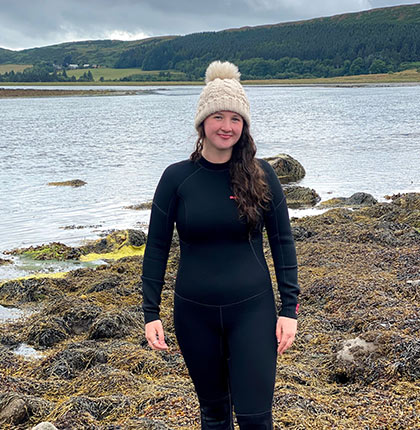Climate change adaptation: Evaluating long-term resilience of the Scottish Marine Protected Area network
Key shifts in species distribution are becoming evident in response to rising climate change pressures, with a focus for species to remain within their specific environmental parameters or species ‘climate envelopes’ (the range of climatic conditions underpinning long-term persistence). Current modern marine conservation practice utilises MPAs as a key measure to conserve threatened ecosystems and species. However, as species begin to disperse, the longterm effectiveness of MPAs in meeting outlined objectives may be limited.
The project aims to evaluate the resilience of the current Scottish MPA network in response to climate change projections to 2045, the year whereby Scotland has aimed to achieve the goal of Net Zero CO² emissions, and beyond. This will be accomplished by investigating a variety of priority marine species that led to the designation of key Scottish MPAs, exploring the changes in their distributions based upon their specific climate envelopes.
The outlined plan for the project is to split the work into two clear sections; the first will focus on evaluating the likelihood for changes in focal species distribution and abundance in response to various IPCC climate change projections. Focal species will represent different classifications of migratory ability (non-mobile, intermediate-mobility and high-mobility). Predictive conservation planning models will be utilised here. The second section of the project will aim to evaluate any policy and/or planning ramifications that may be identified from this first section. From this research, recommendations to evolve measures may be proposed. The advantages and disadvantages of retaining the MPA network in its current state will also be considered and discussed. This section of the project will include collaborations with key marine stakeholders making use of the Delphi method to develop achievable policy objectives whilst highlighting areas of consensus and conflicts.
Supervisors
Dr Steve Benjamins, SAMS
Prof Michael Burrows – SAMS
Professor Tavis Potts – University of Aberdeen
Sarah Cunningham – NatureScot
Funder
Funded by NERC Studentships awarded to the SUPER Doctoral Training Partnership
Start Date
3rd October 2022
University
University of the Highlands and Islands
Higher Education
2022 - MSc Marine Ecosystem Management, University of St Andrews
2019 - BSc (Hons) Marine and Freshwater Biology, Guru Nanak College, University of Glasgow
Fieldwork Experience
Masters Research Project: Assessing the Impact of Seagrass (Zostera noltii) beds on Sediment Deposition and Carbon Sequestration at The Firth of Tay Estuary. Undertaken by deploying sediment traps, taking sediment cores, and conducting seagrass distribution survey stem counts using quadrats.
Loch Sween Expedition (2-weeks): Co-leader of a two-week Loch Sween MPA snorkeling expedition in Tayvallich, Scotland. 500+ photos and GPS coordinates to visually map out the seabed and intertidal fauna and flora species in conjunction with the University of Glasgow and NatureScot.
Undergraduate Research Project: Preliminary snorkeling and camera surveys investigating and recording the distribution and condition of the epifaunal and epifloral species and seabed in the Linne Mhuirich rapids.
University Field courses to SCENE and Millport.
Seasearch Observer Volunteer
St Andrews Aquarium Volunteer (1 year)
Biodiversity Conservation Volunteer (2 years)
RSPB Student Volunteer (1 year)
Training Courses
Seasearch Observer – Seasearch Observer #899
Royal Yachting Association (RYA) - Powerboat Level 2 License
PADI – Padi Open Water Diver
Coursera – Animal Behaviour and Welfare
Coursera – Ecology: Ecosystem Dynamics and Conservation
